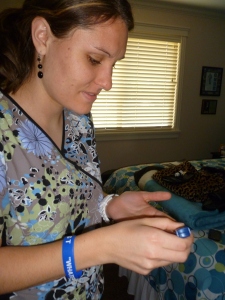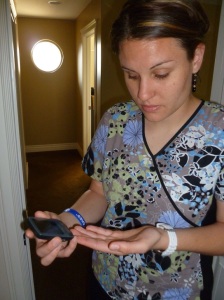As a healthcare provider without diabetes, I will never fully understand what it is like to live with diabetes. I do however try my best to understand the day-to-day challenges as best as I can. I have tested my own blood sugars, worn all the insulin pumps and CGM devices, taken saline injections, etc.; I also engage in the DOC. To try to encourage other healthcare providers to gain better perspective on diabetes, I worked with members of the DOC to set-up a fakebetes challenge. Whitney, a new nursing graduate, and Kim Vlasnik both volunteered to be first to take this challenge, and were paired together. In this fakebetes challenge, Kim text Whitney fake insulin doses, including a carb ratio and correction factor; and blood sugar readings from her own glucometer. Whitney was encouraged to check her own blood sugars and count carbohydrates, but take saline injections according to the blood sugars Kim had text text her (this way there would be some blood sugar readings in different ranges to think about and respond to). Whitney was able to ask Kim questions throughout the 1-week challenge. Below is Whitney’s take on her experience, you can find Kim’s here.
Why did you agree to the fakebetes challenge?
I chose to accept the fakebetes challenge because I felt this experience would help me to better come to understand diabetes on a different level. I feel that once you have actually done something yourself you can have greater understanding and sympathy for others. Being an RN I know I will come in contact with many patients that have diabetes. I felt like like taking this fakebetes challenge would allow me to be a more experienced RN to better help my patients.
I recently have had a couple friends and family members diagnosed with diabetes. This brings diabetes closer to home. Being in the medical field some of these family and friends have come to me at times to ask questions about their diabetes. I knew that this experience would overall be a positive experience.
What surprised you the most?
There were two things that really surprised me. First, I was surprised at how many carbs certain foods have. Prior to this experience I had never really paid attention to how many carbs certain foods had. A specific example would be a banana, I had no idea a medium sized banana has 20+ grams of carbs!
The second thing was how time consuming it was to check your sugars, prepare and give insulin injections, count carbs and plan out meals to eat a well balanced diet while trying to stick to a certain # of carbs for each snack or meal. While participating in this fakebetes challenge I was training for and running my first half marathon. While working with Kim V. I came to learn methods of what to do with diabetes while experiencing this rigorous type of exercise. I It took more time to closely monitor my sugars, but what a great way to see that being a diabetic doesn’t stop you from reaching and setting goals, especially physical goals.
What didn’t surprise you?
Working in healthcare I knew that checking sugars 6+ times a day would not exactly be my idea of fun. I don’t know of many people who love needles or getting poked. I am one of those people who don’t really enjoy getting poked, so this part of the challenge didn’t really come as a surprise. I do have to admit that by the end of the challenge I was used to poking myself and it became easier and easier to do so.
What did you think about the experience overall?
I really enjoyed this fakebetes challenge. I came to have greater sympathy for patients with diabetes and what they do to maintain their health. I felt for me diabetes was time consuming and I realized it would take time, patience and support to really adjust to this kind of lifestyle. This experience helped me to become more aware of those around me. I came to realize how this really affects all areas of your life, especially socially. How hard it would be to be a newly diagnosed diabetic and to check sugars, give insulin, etc when out it public. I am grateful I had this opportunity to experience and learn all that I did.
Would you recommend this type of experience to other healthcare providers? If so, Why?
Yes. I would highly recommend this experience to anyone that works in healthcare. I would also recommend an experience like this to any family members or close friends of a diabetic. This was a great valuable way to learn more about diabetes. I believe that hands on learning is one of the best ways to learn and this experience allowed for an opportunity excellent hands on opportunity.
Thank you both Kim and Whitney for agreeing to the fakebetes challenge! This is healthcare providers learning from patients at its finest. If you are a DOC member or healthcare provider interested in taking the fakebetes challenge, please feel free to contact me.


Very cool.
This is amazing to see! It’s good to know some health care providers care enough to learn in this way about life with diabetes. As someone who’s had Type 1 for over 22 years I’ve run into more than my fair share of HCPs who haven’t got a CLUE what it’s like – and it’s frustrating and disheartening, because they are the ones who are supposed to be supporting us in caring for ourselves.
Thank you for your comment Kari. I hope many more HCPs will be willing to take on this challenge.
I’ve had T1D for 29 years and would be happy to participate in this challenge with an HCP. What can I do?
Thanks Katie S., I am rounding up some health care providers now. Please send me your email so we can be in touch.
Hi Michelle–
Per your comment below my email is FMKatie38@comcast.net. Glad to help!
Sent from my iPhone
>
I loved reading Kim’s post about this earlier today and now yours! I too would be happy to participate as a t1d for 14 years.
Great, thank you! I am in the process of rounding up some HCPs right now. Can you please send me your email and I will connect with you soon? Thanks again!
jennifercruze@hotmail.com
Pingback: Friday Six: But Not On Friday. - Six Until Me - diabetes blog
A week of diabetes. Not everyone would bother or be able to last an entire week. I read Kim’s post and she did a great job showing you what her week was like, minute by minute, although she admits sparing you some common frustrations (loved the did-I-forget-my-meter panic). But the experiment was finite. You knew it would end. We know it never will.
Thank you for your comment. I know that it is impossible to recreate actually having diabetes, but hopefully this offers a glimpse with the aim to improve HCP knowledge.
Pingback: Around the Diabetes Blogosphere: Hot Summer 2014 Edition : DiabetesMine: the all things diabetes blog
Pingback: Fakebetes HCP Challenge: The PA Student | Health in the Presence of Social Media
Pingback: Fakebetes Challenge: Guest Post by Jennifer Cruze | Health in the Presence of Social Media